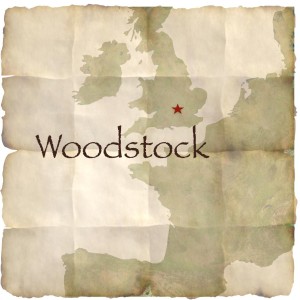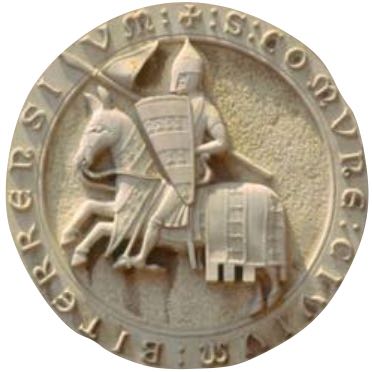
Desperate people, doing desperate things, with no consideration for the rules of conflict, only what is necessary to win.’
Jean Froissart 1st March 1355
Within an hour, a burst of spring sunshine had driven the rain away but clouds still hung low over the Palace.
It had taken Jean Froissart nearly four weeks to get back to London from Foix. Then he had discovered that the King was absent from London attending the tournament at Woodstock.
Jean had never previously been to Woodstock and was pleased to have the opportunity to go there. He had arrived early and was now trailing behind the King, down the path towards the lake.
Jean screwed up his nose in protest at the pervading stench of primitive privies and stale beer. These smells were interspersed with the odours of burnt roast meat and the dying embers of the fires, from which smoke, dampened by the rain, hung close to the ground. Jean looked around in wonderment at the remnants of the tournament.
The heralds, jesters and acrobats had gone and instead the lists that had yielded dramatic combat only the previous afternoon had left twin strips of muddy sawdust across the manicured lawns of the palace. The banners and all other decorations had been removed, leaving only the crudely constructed skeletal remains of the stands. Tons of rubbish that the crowd of some two thousand had left behind compounded the effect of abandonment. Even though the wind was no more than a whisper, scraps of paper and cloth chased each other in ever-repeating circles across the lawns.
Only four flags remained as a reminder of the pageantry, fluttering feebly in the damp morning. Jean recognised the four flags. The largest and highest displayed three leopards passant on a golden background, the blazon of the King himself.
In front of it, to its right, was a flag bearing a single lion rampant, again on a gold background, the blazon of King Edward’s son. The Prince was known formally as Edward of Woodstock, as he had been born in the palace. Alternatively, on account of the unusually dark skin, he had inherited from his mother, he was known as the Black Prince and even more commonly as ‘The Prince’, even by his own family.
To the left fluttered a totally different flag. This flag was quartered, with the top left and bottom right quarters consisting of three blood-red diamonds on a white background, whilst the other two quarters showed a green eagle on a gold background. This flag was the blazon of William Montacute, Earl of Salisbury, the Prince’s best friend.
Watching carefully where he put his feet, Jean followed the King towards the flags.
Some distance away, in the area that the previous day had been reserved for commoners, a silver-blue flag quivered and danced. It seemed to find life from the slightest breeze even when the other flags hung limp.
As they got closer, Jean observed the silver-blue flag to be a much lighter material than the other flags. The material had been dyed, not embroidered, with a montage of turquoise and silver diamonds, the traditional emblem of Saxon Kent, which had recently been adopted by Joan, Countess of Kent, in a gesture of independence and defiance.
Jean hastened to keep up.
The King sighed. ‘This is appalling. It is as if chivalry itself has died and these people are picking over the remains!’
‘Sire?’ Jean hastened to reply.
‘As the concepts of chivalry demand, this week we have seen remarkable honourable conduct mixed in with skill at arms.’
‘It is only to be expected, but you obviously have something specific in mind?’
‘Of course, yes! Yesterday, the Prince, my son, fought his best friend the Earl of Salisbury, in a contest in which either of them could have been killed. The heralds and those who gamble on the results of a tourney described it as a grudge match. They used the information from your writings, Monsieur Froissart, to make it public knowledge that the Earl was married to Joan, Fair Maid and Countess of Kent, but that the Prince was her lover. That though she is now married to someone else, both the Prince and the Earl are still her lovers.’
‘Sire, I played no part in this calumny.’
‘I believe it was you who made this information public in the first place. I was so annoyed to see that as my son and his friend made their way to swear their allegiance to me they made no secret of the fact that they both had a filmy scarf of silver-blue silk tucked under the side of their breastplate. Both were carrying Joan’s favour into the final round of the tournament. It was at that point that those in the commoners’ reserve raised the flag of Kent, which is still flying now. The implication was clear. No matter what the outcome, Joan wins!’
He whirled around, grabbed a worker by the arm and pointed at the silver blue flag.’Remove that flag now before you do anything else,’ he screamed.
He turned again to Jean, breathing hard; his nostrils flared.
‘You see, Monsieur Froissart, you have a lot to answer for.’
The King held up a hand in front of Jean’s face. ‘No.’ He closed his eyes for a moment and sighed. ‘Where the information came from is not important. Both the Prince and the Earl desperately wanted to win, but not because of Joan. They both wanted to be champion. The combat was admirable, the essence of chivalry. They both complied with the rules, and at the end, they embraced and celebrated together.’
‘It is how tournaments should be,’ Jean said, attempting a smile.
The King turned away and bowed his head.
‘I worry, Monsieur Froissart. Times are changing. Chivalry itself is dying.’
‘Dying?’
‘Desperate people, doing desperate things, with no consideration for the rules of conflict, only what is necessary to win.’
‘But the Prince and other young men still show all that is best in chivalry.’
The King sighed. ‘All too soon they will have to accept the most arduous responsibility. Who knows what will tempt them?’
He cast a lingering glance at the destruction of his lawns. ‘Come, let us return to the palace. It is all most distressing.’
Jean continued to trail behind the King as they retraced their steps, eventually ascending the main staircase of the palace, which led directly to the King’s study. The Palace of Woodstock was a family home, unfortified, and a tribute to the peaceful times enjoyed by the citizens of Southern England. Patterned stone floors, glowing oak woodwork, tapestries, carpets and cabinets all contributed to the rich interior. The King’s study was the epitome of comfort, style and tradition. He seated himself at his desk with his back to a roaring fire.
Jean positioned himself in the centre of the room as the King did not give him permission to sit. His conversations with the king were rarely comfortable. He could only hope that the report he had prepared was well received.
